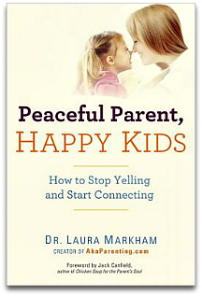 Gosh, do you ever feel drained trying to be a stand up parent all the time?
Gosh, do you ever feel drained trying to be a stand up parent all the time?
A few weeks ago, I was feeling really down about my parenting.
Our son was starting daycare soon, and I wanted to make the most of my last few long weekdays alone with him.
But I was tired, and he wasn’t in the mood to nap. So, instead of doing anything fun with him, I was sitting in a mess of toys feeling guilty.
My husband called to let us know he’d be working a bit late, and I unloaded my disappointment in myself.
His advice?
Read him a book, and do something that makes him laugh.
My husband doesn’t read many parenting books, but he’s got wonderful parenting instincts. His two-minute action plan for me (!) was based on a parenting principle that applies to so many situations.
 I’ve seen the same principle spelled out in Dr. Laura Markham’s Peaceful Parent, Happy Kids
I’ve seen the same principle spelled out in Dr. Laura Markham’s Peaceful Parent, Happy Kids. This book is a gold mine — it’s on Sumitha’s list of The Only 4 Books You Need to Become a Great Parent. You should read the whole thing, in your copious spare time. 🙂
But today I want to focus on one lesson from Dr. Markham that really surprised me when I first read it: You and your child can conquer negative emotions using laughter; not just distracting yourselves in the moment, but using the benefits of laughter to heal and grow your mind and heart.
We all know a little about this. When my son is fussing about a diaper change, I can almost always get him grinning again with a big raspberry to the belly.
Laughter can defuse a tense situation, like the dreaded diaper change, and it can distract you from your troubles; I’ve been known to binge-watch TV sitcoms when I’m down.
And studies have shown that laughter isn’t just an escape! Sure, it works better than other distractions, but it has wonderful longer-term benefits, too.
This isn’t a new insight, of course. People have been writing about it for hundreds of years, long before we could describe it in biochemical terms. Seven hundred years ago, in 1413, the Catholic mystic Julian of Norwich wrote extensively about the benefits of laughter. In 1530, Martin Luther wrote to his friend Jerome Weller with practical advice for times of serious spiritual upset:
Whenever the devil harasses you, seek the company of men or drink more, or joke and talk nonsense, or do some other merry thing.
So today, let’s take a bit of a step back from how to become fine parents and simply take a look at a few of the scientifically proven benefits of laughter that every parent can take advantage of –
Laughter dials down stress hormones immediately
 Right away, as soon as you start laughing, your brain and body chemistry start changing for the better.
Right away, as soon as you start laughing, your brain and body chemistry start changing for the better.
We’ve all experienced this effect, and plenty of studies confirm it. Laughing decreases feelings of stress and physical pain, and improves your immune response.
In fact, these changes can begin even before you start laughing! This is important for practical self-care: if you’re angry or upset, and you can’t switch straight to making yourself laugh, it can help just to anticipate laughing.
You can teach this process to your kids, too. It gives them more options for fixing their grumpies: sometimes what they need is a long talk, sometimes what they need is a hug, and sometimes what they need is a silly dance party.
If you defuse a tense family mood now and then by throwing on some music and busting a move or two, they’ll learn that laughing together can help them feel better.
Later on, if you’re in the car when a Mood hits, just referring back to the silly tradition you’ve now established can make them laugh and defuse the situation.
After a few rounds, they’ll have this tool in their own emotional toolboxes too.
Laughter improves our ability to deal with future stressors
 Every moment we spend on laughter and positive thinking builds these habits for the future. And the immediate physical and mental changes induced by laughter have a cascading effect!
Every moment we spend on laughter and positive thinking builds these habits for the future. And the immediate physical and mental changes induced by laughter have a cascading effect!
As we saw in the previous section, laughter is the best medicine and can improve your immune response in addition to decreasing pain and stress. This leaves you in a much better position to deal with the next stressful thing that comes down the pike; nobody’s at their best when they’re sick or hurting.
And — just like any habit — if you keep practicing, you’ll strengthen and reinforce your brain’s pathways for responding to stress with laughter. It can be really hard to get started, to break the tension with a joke or game when your fight-or-flight reactions are going full blast. But every step helps!
Laughter bolsters our relationships and makes us more compassionate
 The Dalai Lama has described himself as a professional laugher, pointing out that shared laughter is an important way to build close, affectionate relationships with friends and family.
The Dalai Lama has described himself as a professional laugher, pointing out that shared laughter is an important way to build close, affectionate relationships with friends and family.
A 2010 study examined the role of laughter in jury deliberations. This is a situation where the stakes are high and power dynamics can be both informal and stressful — sounds kind of like parenting, doesn’t it? Laughing together helped jurors move past tensions and misunderstandings. By laughing at themselves, the jurors were able to come together to work on their difficult job.
By laughing with your kids about any silly thing, you’ll strengthen your relationship, and you’ll gain empathy for one another. From gently tickling your baby’s ribs to exchanging puns with your teenager, laughter provides an easy, fun, free-of-charge bonding experience.
When your relationship is back in a closer, happier phase, everything works better.
Laughter can help us work through specific problems
 You can also use laughter in a more targeted way to deal with your family’s specific challenges. Dr. Markham gives some good examples of this practice in Peaceful Parents, Happy Kids.
You can also use laughter in a more targeted way to deal with your family’s specific challenges. Dr. Markham gives some good examples of this practice in Peaceful Parents, Happy Kids.
She recommends daily play sessions, which she calls Special Time, as preventative maintenance against tantrums and other misbehavior. Parent and child take turns picking the Special Time activity.
Dr. Markham suggests,
When it’s your turn to decide what to do, initiate games to build emotional intelligence and bonding. Quiet talking and cuddling is okay once in a while, but your goal is to help your child release pent-up anxiety… and the most direct path is laughter. (emphasis mine)
If you want to use games and laughter to release your child’s anxiety about a specific problem, you can role-play about the situation in question: playing Teacher if she’s having homework troubles, playing Baby if she’s jealous of a new sibling, playing power reversal games for any number of troubles.
But you don’t have to spend a lot of time contriving a game that’s related to what you think might be bothering your child, and sometimes you don’t even have to figure out just what it is that’s bothering them — especially with really little kids, who may not know what’s wrong themselves. Dr. Markham’s advice:
The goal is giggling, which releases the same anxieties that are off-loaded with tears, so whatever gets your child giggling, do more of it.
(Interestingly, she doesn’t recommend tickling for this purpose, since the giggling that goes with tickling is a completely different response.)
Okay… now what?
So, for hundreds of years — from Martin Luther to Laura Markham — writers and researchers have been urging us to use this simple strategy: laugh, and laugh together, to defend our emotions and our relationships against a variety of troubles.
So, when you start to feel the onset of an emotional slump (your own, or your child’s) — lighten up! If you can come up with a way to make everyone laugh, great. If you can enlist your kids to do it for you, even better. And in the case none of you can muster it up, it’s just as fine to flip out your phone and watch a few funny videos on youtube — here, here, here and here are a few to get you started 🙂
(And go ahead, share your favorite funny videos in the comments below for the rest of us to enjoy!)
The 2-Minute Action Plan for Fine Parents
So for our 2-minute contemplation questions today –
- Do you sometimes feel a little too stressed by the pressure to be a “great” parent?
- How often do you just totally, completely let go and laugh with your kids till your tummy aches?
- Now that you know all the benefits of laughter, do you feel a little bit of pressure sneaking up on you to be more funny or else you wouldn’t be a great parent? 🙂
The goal of these questions, as always, is to simply take stock of how much you are actually cashing in on the benefits of laughter and to come up with a clear(er) picture of how to lighten things up in your family, without turning this into another major quest! And with that in mind, here are a few things to try this week…
The Ongoing Action Plan for Fine Parents
Yes, there are a lot of great benefits to cracking up and laughing together! But don’t do it just because research says you should!!!
Over the next week, look for ways to genuinely lighten up and enjoy a few good laughs with your kids. Joke around or roughhouse with your kids, even for just 5 or 10 minutes, when an opportunity presents itself. And opportunities will present themselves!
For instance, instead of nagging your kids that it’s bedtime, chase them around like a goofy zombie all the way into the bedroom. Instead of Big Serious Talk at the dinner table, share some of the old knock-knock jokes or silliness from your childhood. And instead of insisting on no screen time, say “we’ll watch one funny video and then it’s time for bed, deal?”
Funny doesn’t have to be serious business!
There’s an old saying that laughter is the best medicine. Indeed! Thanks for a wonderful reminder that this is a dose that should be taken, and enjoyed, daily.
Yup, like the daily vitamins 🙂
When my daughter finds something that makes my husband and I really laugh or continually makes us laugh weeks later, she milks it for all its worth. 🙂
You know, Bernadette, my daughter does that too! If she says something funny, and we laugh she is almost guaranteed to repeat it, either right away or at some other time, to get a little more mileage out of it 🙂
Great article! Thank you for this reminder to laugh more 🙂
Glad you liked it, Melanie 🙂